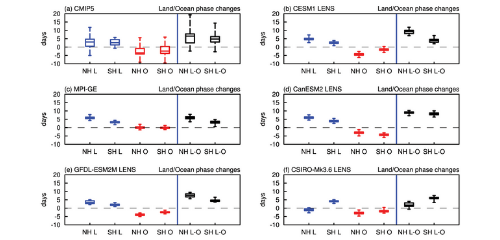Why is the seasonal delay of tropical rainfall only evident over land?
The robust delay in the seasonal migration of the tropical rain band with warming has been a decade-old puzzle, which was cracked recently from an atmospheric energetic framework. As the atmosphere becomes more water-vapor laden under warming, it will require more energy to warm up in the spring hemisphere, which is achieved through an enhanced cross-equatorial atmospheric energy transport from the autumn atmosphere. Under the energetic constraint, this results in a delay in the seasonal migration of the tropical rain. According to the argument, we would expect precipitation in both tropical land and ocean responses with a delay to the forcing of increasing greenhouse gas concentration, but whether this is the case is still unclear.
In a study recently published in Geophysical Research Letters, Song et al. discovered contrasting phase changes of the precipitation annual cycle between land and ocean under global warming, with land delay and ocean advance (Figure 1) by examining simulations from 37 CMIP5 models and five large ensembles (≥30 members; CESM1, MPI-GE, CanESM2, GFDL-ESM2M, CSIRO-Mk3-6). As the present-day precipitation annual cycle over land leads that over ocean, the phase delay over land and phase advance over ocean will make the two more in sync in a warmer future.
The authors found that the seasonal delay of land is mainly attributable to the increased effective heat capacity, while there exists a competing mechanism against the impact of increased capacity for the ocean precipitation. This competing mechanism is manifested as the land-ocean precipitation contrast during summer, with more precipitation increase over ocean. This mechanism runs counter to the capacity-induced delay and even reverses it to a phase advance over ocean. The competition between these two mechanisms over ocean leads to uncertain phase changes over 25°S-25°N but mostly phase advance over 40°S-40°N.
The more precipitation over ocean than land in summer under warming is linked to the enhanced surface temperature annual cycle over ocean and reduced one over land. The former is found to be related to the wind-evaporation-sea surface temperature feedback by turning on/off the feedback in a coupled model. The reduced annual cycle of surface temperature over land, on the other hand, can be rationalized as the consequence of the increased atmospheric effective heat capacity and enhanced surface cooling feedback by a simple atmosphere-surface interaction model.
Overall, this study first revealed that there will be a robust seasonal delay of rainfall onset over tropical land caused by the increased effective heat capacity. The reduced annual cycle of surface temperature over land and enhanced annual cycle of surface temperature over ocean together increase precipitation over ocean during summer, which offsets the delay that would have be caused by the increased heat capacity. As most human activities take place over land, the socioeconomic impacts of the robust seasonal delay of rainfall and reduced temperature annual cycle need to be systematically evaluated in the future.
Contrasting phase changes of precipitation annual cycle between land and ocean under global warming (Geophysical Research Letters)
Topics
- Water Cycle
- Climate Change

